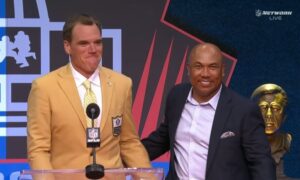As we’ve previously reported, Judge Anita Brody earlier this week granted preliminary approval for an amended settlement agreement between the NFL and retired players regarding the league’s financial responsibility in caring for players following their playing days who suffer from the effects of concussions sustained during their career.
The decision has left many players, including former teammates, on opposites sides of this issue, including former Pittsburgh Steelers.
Former All-Pro guard Alan Faneca is one among seven retired players (including another former Steeler, Sean Morey, who has been active in campaigning for concussion education) that have filed an objection against the amended settlement, prior to its preliminary approval.
His former teammate along the offensive line, however, was pleased with the ruling.
Former Steelers All-Pro center Jeff Hartings embraced the judge’s decision, saying that he’s “just happy for the guys who will get immediate assistance when they need it”.
Faneca, however, is not so convinced that retired players will so easily and readily benefit from this ruling as it is formatted.
Part of the objection to which he is a plaintiff argues that the agreement constructs a labyrinth of bureaucracy and paperwork that retired athletes must wade through, a system, it contends, that is designed to limit the number of applications and payments issued.
Another worrying facet of the agreement is the restrictions placed on the specific scenarios of cognitive illness that it covers. Faneca recently spoke about this during an interview on Sirius XM Radio:
“The window is so small when it should be 10 times as big because there’s that much potential out there. What we’re after is broadening the scope of things and not closing the window on so many guys and excluding future guys, guys that might not have problems now”.
Part of that restrictive window is an exclusion of living players suffering from chronic traumatic encephalopathy and other milder brain injuries, but show no other symptoms.
Of course, there is currently no reliable means of verifying the existence of CTE in a living brain, but the purpose of further research and education is to make it easier to identify these issues, including locating instances of CTE before death.
For many retired players, however, the potential for an end in sight is too tempting to pass up, even if the solution is far from perfect.
One of those retired players is former Steeler Frenchy Fuqua, who is among an untold number of former football stars now paying for the damage they put their bodies through in their later years.
“Overall, there are a ton of players who are similar to me”, he said. “They’re forgetful. They’re redundant. They can’t remember things. I’m really proud of the players association and the owners for the NFL teams…They’re taking care of guys and there are a lot of guys who are in need of help”.
He has spoken to a number of peers who are in the same boat as he is, or worse. When you hear those voices, it must be more tempting to take what’s already in front of you rather than pushing on for a more satisfying answer for the long term.







